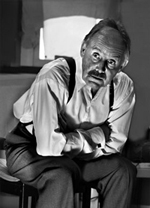THEATRE 1985-2012
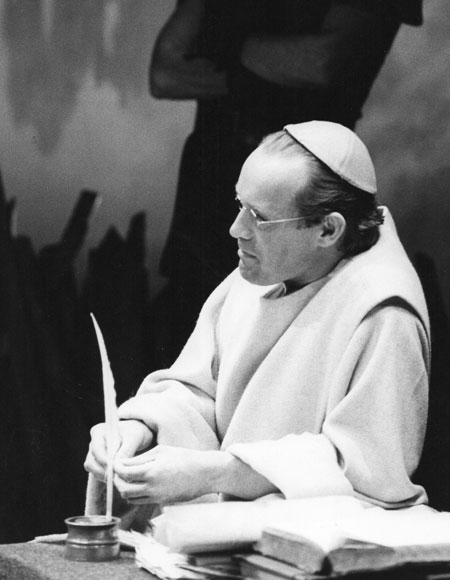
HONG KONG FESTIVAL AND UK TOUR
St Joan
by George Bernard Shaw
Directed by Clifford Williams
Role: Brother John, the Inquisitor
Cast included Jane Lapotaire, Anthony Quayle, Tony Britton, Ralph Michael
Clive Francis as the bespectacled Inquisitor, is a severely etched, fastidious fanatic.
John Peter, The Sunday Times
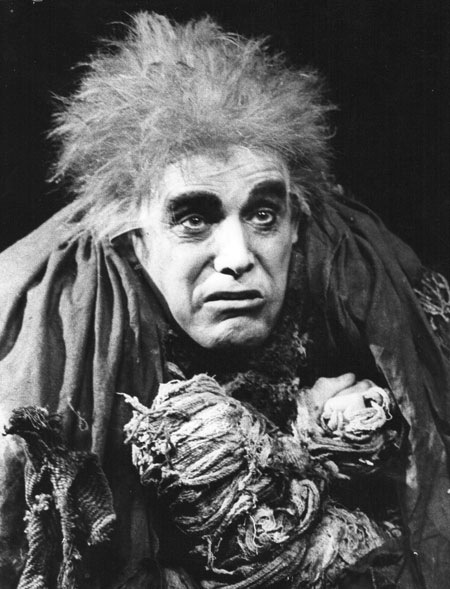
HONG KONG FESTIVAL AND UK TOUR
The Tempest
by William Shakespeare
Directed by Anthony Quayle
Role: Caliban
Cast included Anthony Quayle, Tony Britton, Ralph Michael, John Sharp
Clive Francis’ Dracula-fanged Caliban: a performance which at once extracts heart-breaking music from the lines and acquires fruity club-land vowels once the bottle has been the rounds.
Irving Wardle, The Times

CHICHESTER FESTIVAL THEATRE
An Ideal Husband
by Oscar Wilde
Directed by Tony Britten
Role: Lord Goring
Cast included: Joanna Lumley, David Gwillim, Lucy Fleming, William Fox, June Whitfield
Not an ideal start to any rehearsal period as our first director had a nervous breakdown, causing great distress amongst the cast, especially dear Jo Lumley. Luckily Tony Britton was available to step in at breathtaking short notice, and all was saved. It was during the run of this play that I was asked to design the poster for The Importance of Being Ernest which I agreed to do on the understanding that I played John Worthing! Just as well I did as it introduced me to my wife, Natalie Ogle.
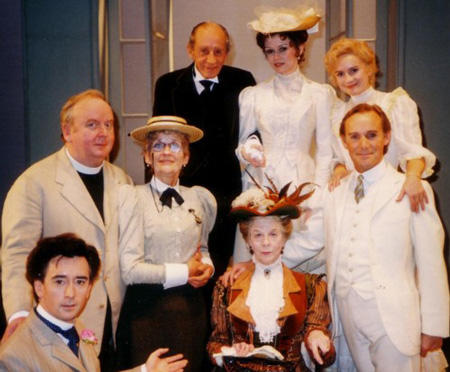
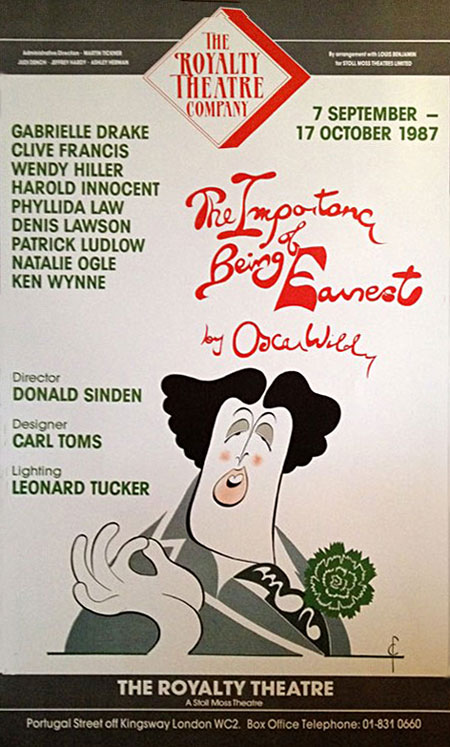
ROYALTY THEATRE
The Importance of Being Earnest
by Oscar Wilde
Directed by Donald Sinden
Role: John Worthing
Cast included Wendy Hiller, Natalie Ogle, Denis Lawson, Gabrielle Drake
Clive Francis is the perfect John Worthing, his body inclining forward at an alarming angle when hypnotized by his future mother-in-law.
Charles Osborne, The Observer
Clive Francis cleverly invests John Worthing with an air of anxious melancholy.
Francis King, The Sunday Telegraph
Apart from being my first West End poster design, this happy production brought me together with so many dear friends; Donald Sinden, Ken Wynne, Gabrielle Drake and my wife to be, Natalie Ogle. Because of Donald’s influence we had a glittering first night attended by her Royal Highness, Princess Margaret, and any amount of actors, politicians and ‘everyday’ folk. The Royalty Theatre, now the Peacock, from where This is Your Life was televised, and somewhere I’d not been to since guesting on Jimmy Logan’s. Though far too old for the part, Wendy Hiller was a joyous Lady Bracknell, with whom it was a great privilege to work with. She also had a glorious sense of humour, something Lady Bracknell was not famous for!
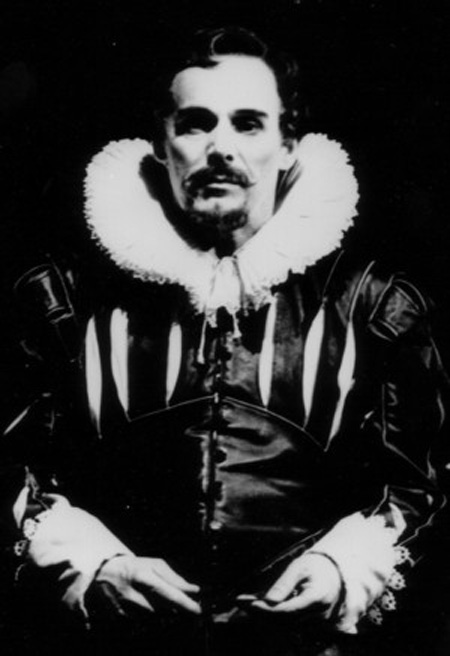
NATIONAL THEATRE
’Tis Pity She’s a Whore
by John Ford
Directed by Alan Ayckbourn
Role: Vasques
Cast included Rupert Graves, Michael Simkins, Polly Adams, Suzan Sylvester
Clive Francis’ oily, saturnine Vasques is exceptional.
John Peter, The Sunday Times
Clive Francis signals Vasques nationality and attitude with a voice of supercilious fastidiousness, just short of caricature, in a performance which gradually dominates the stage.
Irving Wardle, The Times
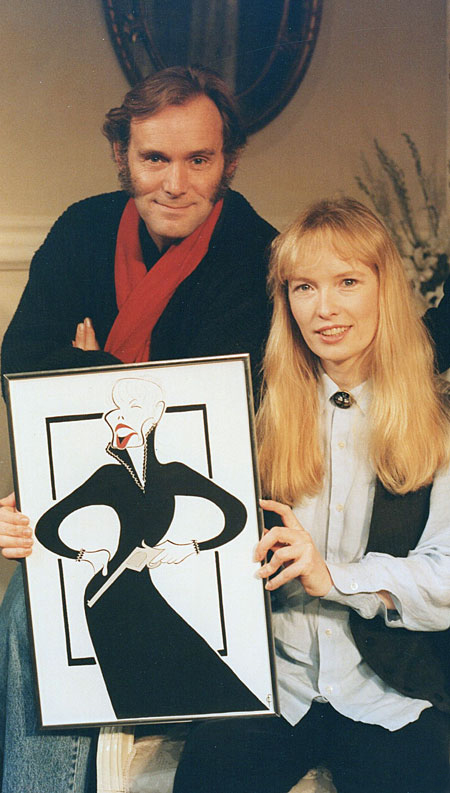
HAMPSTEAD THEATRE
Heda Gabbler
by Henrik Ibsen
Directed by John Dove
Role: Judge Brack
with Lindsay Duncan, Dermot Crowley, Jonathan Coy
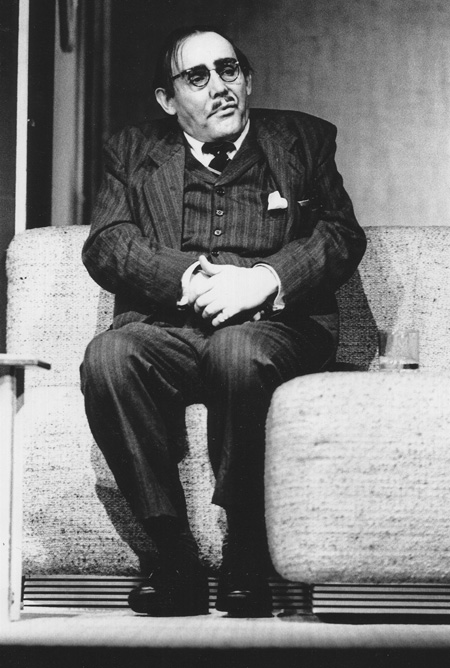
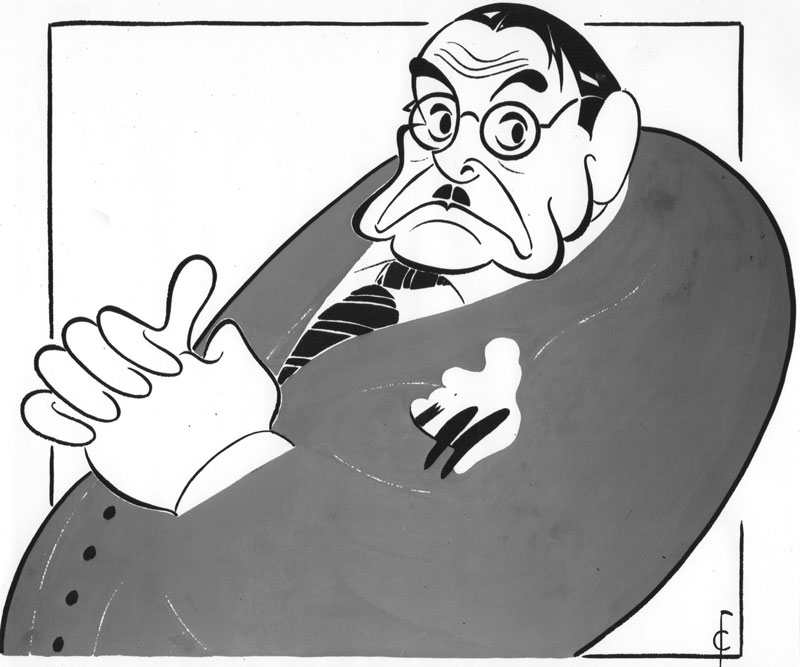
NATIONAL THEATRE
A Small Family Business
by Alan Ayckbourn
Directed by Alan Ayckbourn
Role: Benedict Hough (for which CF won the Clarence Derwent Award)
Cast included Stephen Moore, Polly Adams
Clive Francis, an actor one tends to associate with suave stylishness, gives a brilliant character-performance as a slimy private investigator. Presenting us with a man with no neck, a positively furtive moustache and a beady glitter in his eyes as he dwells on the delight of corporal punishment … it is a performance of Dickensian richness.
Michael Billington, The Guardian
I have so many happy memories of this production, it brought me to The National Theatre for the first time, won me my first stage award, (the Clarence Derwent), and gave shelter to my first major exhibition held in the Lyttelton foyer. But it was also tinged with huge sadness as I lost my father during rehearsals. Alan Ayckbourn and his wonderful cast couldn’t have been more supportive, an act of kindness I shall always be grateful for.
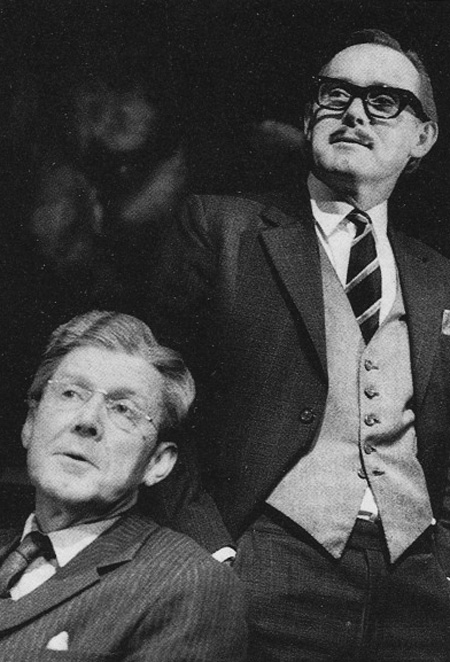
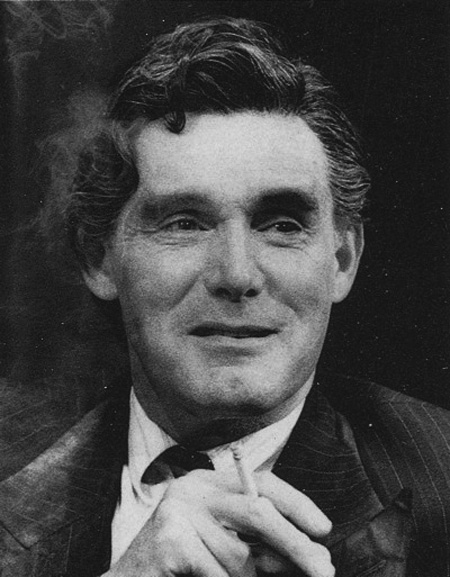
QUEENS THEATRE
Single Spies
by Alan Bennett
Directed by Alan Bennett and Simon Callow
Two one act plays written by Alan Bennett
An Englishman Abroad
Role: Guy Burgess
Cast included Prunella Scales and Alan Bennett.
A Question of Attribution
Role: Chubb
Cast included, Alan Bennett, Prunella Scales
It was most fortuitous that I’d been working with Simon Callow only a few weeks before when he told me in confidence that he was considering leaving the cast of Single Spies. I was on to it immediately and the part was mine! Though I only had a short run at the Queen’s Theatre, working alongside Alan Bennett and Pru Scales was something I regard as a highlight in my career, and one I think back on with huge affection.
PALACE THEATRE, WATFORD
Getting On
by Alan Bennett
Directed by Roger Smith
Role: George
Cast also included: Jared Harris, Serena Evans, Gregory Floy, Eleanor Summerfield
Alan Bennett wrote to me: ‘You must be wondering how you can ever be rid of me and my works! Nevertheless, I’m so glad you’re doing it and I shall endeavor to sneak in at some point. Love and luck’.
Alan Bennett did indeed sneak in but no one in the box office recognized him, even though there was a six-foot photo of him hanging in the foyer. ‘We’re sold out, sir, I’m sorry. Alan Bennett’s very popular here you know.’ Being too shy to explain who he was he took the only seat, which happened to be at the back of gallery.
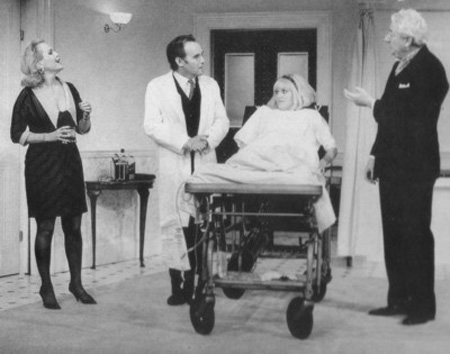
WYNDHAMS THEATRE
What The Butler Saw
by Joe Orton
Directed by John Tillinger
Role: Dr Prentice
Cast included Shelia Gish, Joseph Maher, Camille Coduri, Ben Porter, Gary Olsen
Clive Francis’ Dr Prentice sets the tone at once, bounding on like a well-bred athletic and extremely conceited Afghan hound in the terminal stages of lecherous excitement: and he never let’s go of the charming notion that an appearance of polished professional middle-class rectitude can hide, or rather display, a mind like a sewer.
John Peter, Sunday Times
Clive Francis has the sly, dandyish mannerisms of a compulsive seducer.
Milton Shulman, Evening Standard
UK TOUR
Quartermaine’s Terms
by Simon Gray
Directed by Kevin Billington
Role: Derek Meadle
Cast included Edward Fox, James Grout, Peter Barkworth, Sarah Badel
BARBICAN THEATRE (Royal Shakespeare Company)
A Christmas Carol
Adapted from Dickens book by John Mortimer
Directed by Ian Judge
Role: Ebenezer Scrooge
Cast included Polly James, Philip Quast, Paul Greenwood, John Bennet
Clive Francis is completely unrecognizable as Scrooge: this suave and athletic young actor has turned himself into crook-backed little stick-insect with a voice like a piece of glass scrapping on a stone floor.
John Peter, Sunday Times
Clive Francis must surely be giving the performance of his career. Sharp of nose, hollow of cheek and creaky of voice. In the course of the evening this stooped and tiny figure runs an extraordinary gamut of emotions. Charles Spenser, The Daily Telegraph
But then you can’t win ‘em all:
CF’s capering Scrooge is an embarrassing piece of old man acting, with a cracked campy voice reminiscent of John Inman in Are You Being Served.
Michael Coveney, Sunday Mail
The part of Ebenezer Scrooge could not have come a more appropriate time in my life. I was horribly out of work, extremely low and feeling very redundant. I’d been trying to get into the RSC since leaving drama school but every turning always seemed blocked in some way. Working alongside Ian Judge, John Mortimer and a wonderful cast of actors including my ex-wife, Polly James, will always have a special remembrance in my heart. And it was a magical show. Brilliantly designed by John Gunter with music by Nigel Hess and the spectacular Barbican stage to perform it on. It was as the Sunday Times reported; ‘a success the size of a giant Christmas tree appealing to the grown-up in the children and the child in the grown up…’ A month after we finished the run I discovered most of John Gunter’s magnificent set piled high on a refuse dump not far from where I lived; the first indication that this brilliant production had been axed and with it the chances of my ever playing the old skinflint again.
Except, once you’ve played this wonderful character it’s hard to release him. He’d become part of me, figuratively speaking, for over two sell-out seasons, so I decided to adapt the book into a one-man show for myself, something I have been performing around the UK for the past 16 years.
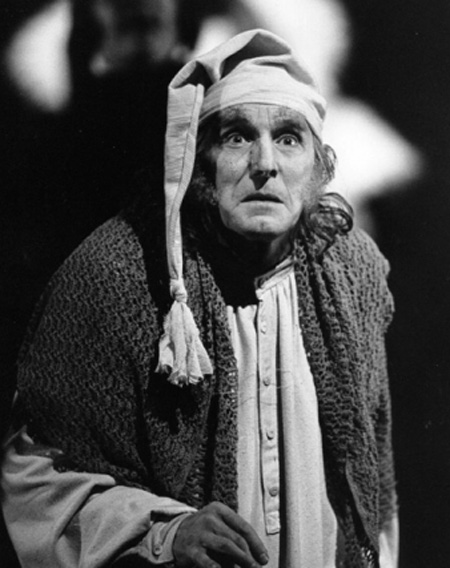
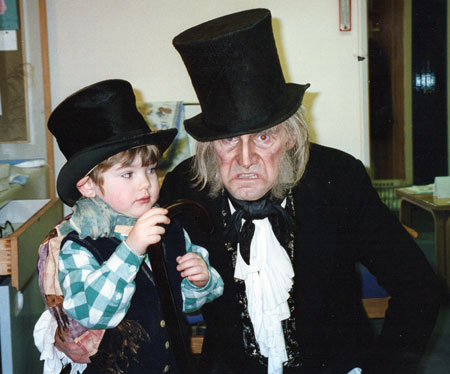
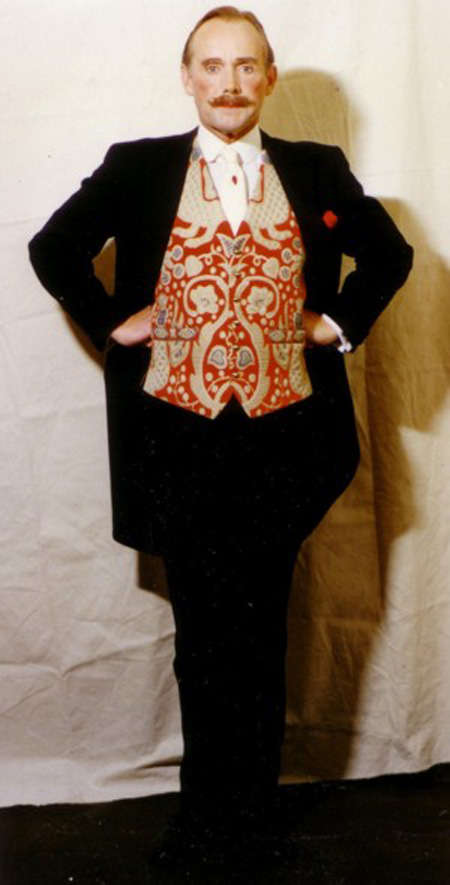
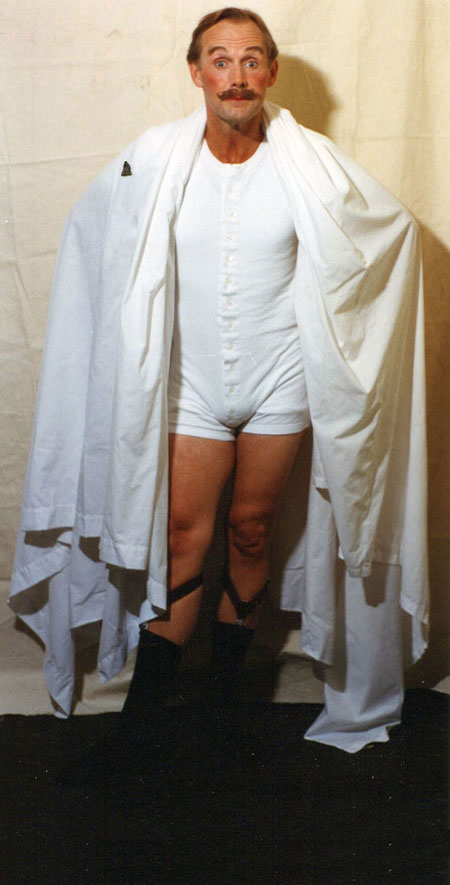
GIELGUD THEATRE
Absolute Turkey
Adapted from Georges Feydeau's Le Dindon by Nicki Frei and Peter Hall
Directed by Peter Hall
Role: Redillon
Cast included Felicity Kendal, Peter Davison, Nicholas Le Prevost
I took over the part of Redillion from Griff Rhys Jones, not the easiest of take-overs as Griff's performance had been brilliant Vaudeville, where as I was trying to capture the purity of Feydeau. It took me some time to accomplish exactly what I wanted, and even then felt I hadn't quite achieved my goal. The play was directed by Peter Hall, whom I never met once!
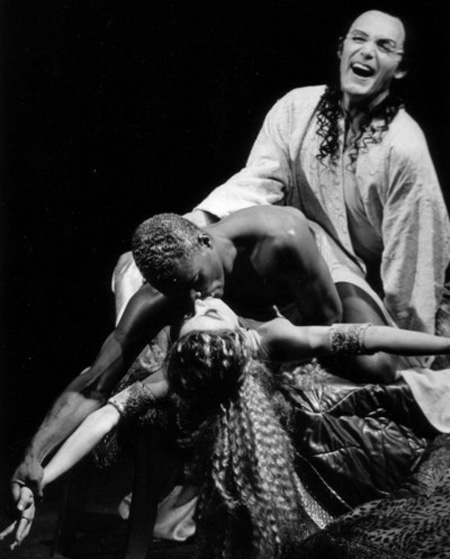
ROYAL SHAKESPEARE THEATRE, STRATFORD-UPON-AVON
Troilus and Cressida
by William Shakespeare
Directed by Ian Judge
Role: Pandarus
Cast included: Joseph Fiennes, Victoria Hamilton, Philip Voss, Richard McCabe, Philip Quast
Specialising over the years in a series of sensitive, manly and raffish fallen angels, Clive Francis seizes the role of the lubricious go-between like a man set free. Speaking the kind of genteel, gin soaked and well-nicotined Stage Posh favoured on the stage in the middle years of the century by stars like Cicely Courtneidge and Beatice Lillie, this Pandarus draws on a rich store of slapped-up theatre and showbiz traditions.
Michael Ratcliffe, New Statesman
Clive Francis has been encouraged to speak Pandarus in the most artificial accent since Geraldine McEwan’s and to play him like a pantomime poof.
Alastair Macaulay, Financial Times
Again Prince Charles came, Highgrove being not that far away. I asked him if he was able to follow the many political and fairly complexed subplots, something I can’t say I ever did. He told me he had sat down the day before and read the play from cover to cover to make sure that he did. There’s dedication for you!
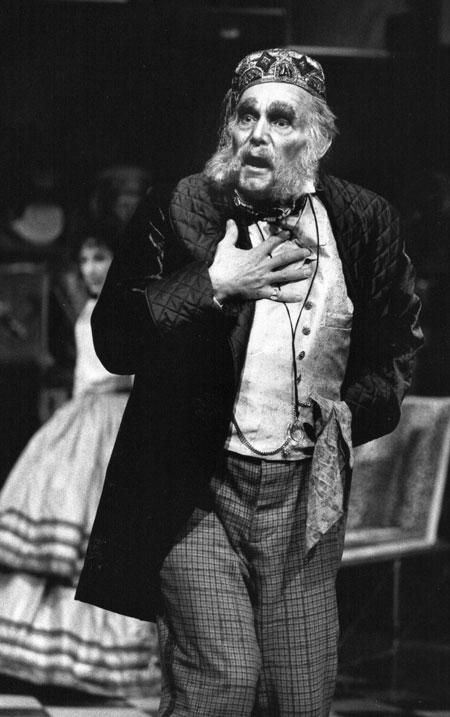
SWAN THEATRE, STRATFORD-UPON-AVON
Three Hours after Marriage
by John Gay, Alexander Pope and John Arbuthnot
Directed by Richard Cottrell
Role: Dr. Fossill
Cast included Jane Gurnett, Richard McCabe, Adam Godley
Clive Francis has the look and posture of a bemused, yet never quite undignified, old gentleman, and gives the character a voice that sometimes sounds as if delivered by well-oiled clockwork.
Jeremy Kngston, The Times
Clive Francis’ appealing moustachioed, Fossil, a quavering lecher-in-waiting, potters suspiciously around the stage ever hopeful of catching his wife in the act.
Nicholas De Jongh, Evening Standard
This production, along with Troilus and Cressida, brought me to Stratford for the first time. Fortunately, I had my young family with me and we rented a cottage out at Chipping Camden, otherwise I think I would have gone mad! Although two wonderful contrasting leading roles this was not the happiest time in my career. One evening Prince Charles attended a performance along with Barry Humphries and entertained a selected few of us to drinks after.
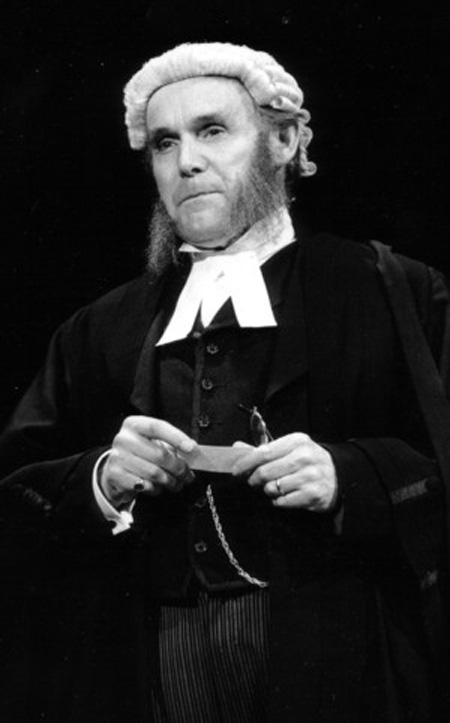
GIELGUD THEATRE
Gross Indecency
Written and directed by Moises Kaufman.
Based on the trials of Oscar Wilde
Role: Sir Edward Clarke
Cast included Michael Pennington
Clive Francis’ dust dry defense lawyer fires the stage with excitement.
Nicholas De Jong, Evening Standard
Clive Francis exudes whiskery sympathy as defense council, Edward Clarke.
Benedict Nightingale, The Times
Oscar Wilde once told Andrè Gide that he had put his genius into his life and only his talent into his work; unfortunately this conglomeration of extracts form the more racier parts of Oscar’s trial, did little to reflect that genius. Still, it returned me once again to the Globe Theatre, and again my name in lights – albeit for a very short time!
TOUR OF UK, ISRAEL AND THE USA
The Shakespeare Revue
Devised by Chris Luscombe and Malcolm McKee
Cast included Gemma Craven, Nicola Keen, Jan Hartley, Martin Connor
Clive Francis gives a masterclass in comic timing.
Jeremy Lewis. Nottingham Evening Post
From Blackpool to Las Vegas! This mad romp of sketches and song, conceived by Malcolm McKee and Chris Luscombe, took us from the UK across to Israel and then down through the States of America. It was a magical experience.
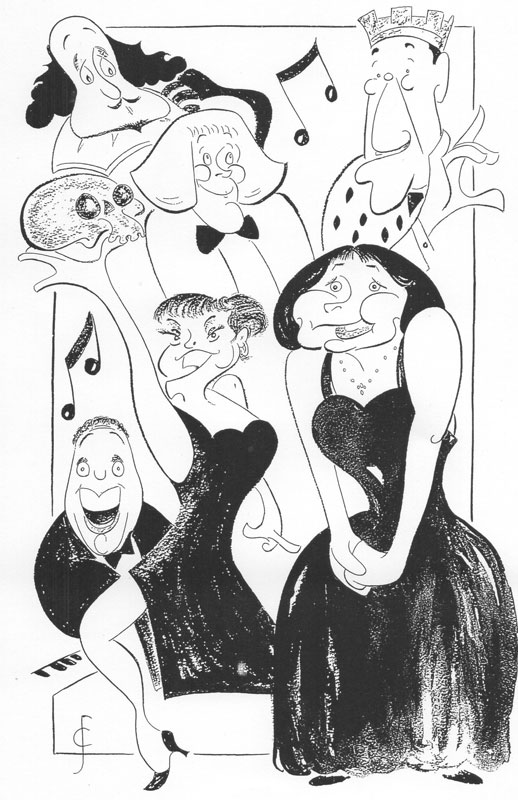
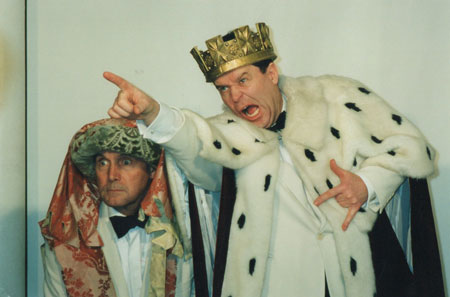
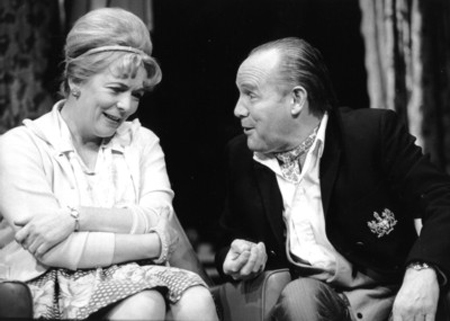
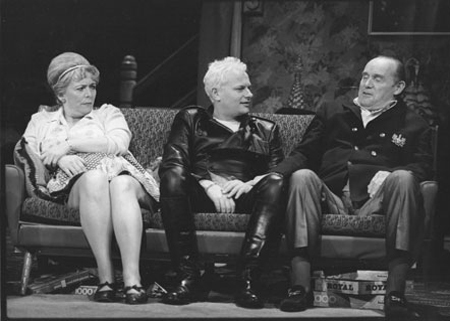
ARTS THEATRE
Entertaining Mr Sloane
by Joe Orton
Directed by Terry Johnson
Role: Ed
Cast included Alison Steadman, Neil Stuke, Bryan Pringle
Clive Francis as Ed almost salivates at the prospect of a uniformed Sloane and captures exactly a certain kind of blazered, gay muscularity.
Michael Billington, The Guardian
Clive Francis memorably captures the itchy, furtive lust of a closet homosexual.
Charles Spenser, The Daily Telegraph
I’ve always had a soft spot for this play ever since playing the eponymous role back in the 60’s. Discovering that the stage rights were available, my agent and I took out an option to see if we could re-launch it, with me this time playing the brother, Ed and Alison Steadman as Kath, together with Terry Johnson directing, we were able to bring Orton's magnificent comedy back to its birthplace, the Arts Theatre. Here’s part of an article I wrote for the Daily Telegraph:
ENTERTAINING MR SLOANE
by Clive Francis – The Daily Telegraph
The television script of this play was the last thing Orton worked on before being battered to death by his lover, Kenneth Halliwell. He had trimmed it neatly down to 90 minutes, a precise and clever piece of adaptation. Various sections were rewritten and a number of very funny lines inserted (some have been included in the new production).
This powerful play exploded on the West End stage at a time when the Lord Chamberlain was still wielding a blue pencil against anything that might upset the morals of his sensitive flock. My first West End appearance, in There's a Girl in My Soup (1966), had come under attack. As I staggered on stage with an appalling hangover, I had to say, "my eyes feel like two piss-holes in the snow." This was changed, at the Chamberlain's insistence, to "rissoles". So it's hard to imagine how, two years earlier, Mr Sloane, the most shocking play of its day, ever made it to the West End.
None the less, his Lordship looked down his nose at certain references. For "arse", "harris" had to be substituted; "shit" had to be changed to "rubbish" and "vaginalatrous" cut completely. He insisted on replacing "tart" ("You're like an old tart grinding to her climax") with "actress". I'm not sure how he would have reacted to a certain performance in 1975, when Beryl Reid and Malcolm McDowell became aware that the audience, having lost interest in Kath's seduction of Sloane, was now transfixed by the other side of the auditorium, where a couple, half-naked, were having it off in one of the boxes. When the grunts of sexual frenzy became too much, the manager tapped at the door of the box and asked them to "desist". "It's all right," they said, "we've finished," and left.
Orton was bemused by the Lord Chamberlain's attitude to his play. "The funny thing about the Lord Chamberlain," he said, "was that he cut all the heterosexual bits and kept all the homosexual ones." (Although homosexuality was rife during the Sixties, it was still a criminal offence at the time.) For instance, Ed, when talking about the crudeness of women, assures Sloane that, "It's a thing you grow out of. With me behind you, boy, you'll grow out of it." But then Orton was the master of the innuendo, writing about sex obliquely rather than aiming it directly at you.
The story is based on fact. Orton's mother Elsie became obsessed by the arrival of a young lodger, a lorry driver, so much so that she was forever spring-cleaning the house and pandering to him. Eventually the family persuaded him to go, leaving behind the germ of a plot, which the young Orton seized upon.
The play opened at the New Arts Theatre on May 6, 1964, to mixed notices. "Not for a long time have I disliked a play so much," wrote The Daily Telegraph's critic, WA Darlington. "I feel as if snakes had been writhing around my feet." Not one to miss an opportunity, Orton began writing letters to the Telegraph under an assortment of pseudonyms, some expressing disgust (most famously Mrs Edna Welthorpe), others supporting the maligned playwright.
Playwright Sean O'Casey saw Entertaining Mr Sloane as a play "to make a man pull his trousers up", and Sunday Times critic Harold Hobson as "a vision of total evil". He went on to say that Orton reminded him a lot of Jane Austen! Terence Rattigan, then regarded as a rather dated figure, considered it to be the most exciting first play he had seen in 30 years. "I saw Wilde [in your play]," he wrote, ". . . in some ways better, because it had more bite. Sloane mustn't die at the Arts."
And thanks to Rattigan's campaigning, it didn't. Entertaining Mr Sloane transferred to Wyndham's Theatre on June 29, 1964, and Joe Orton's short reign as a West End playwright began. Towards the end of 1997 I managed to get hold of a copy of the television version which I had done 30 years earlier. Watching it again, I realised what an extraordinary piece it was. In many ways before its time, and not in the least dated, it seems as relevant now as it was when it first appeared.
The stage rights being available, my agent and I took out an option to see if we could re-launch the play, with me this time playing the slippery Ed. With Alison Steadman as Kath and Terry Johnson directing, we were able to bring Orton's magnificent comedy back to its birthplace, the Arts Theatre. It's still a disturbing and funny play, one that I'm proud to be part of.
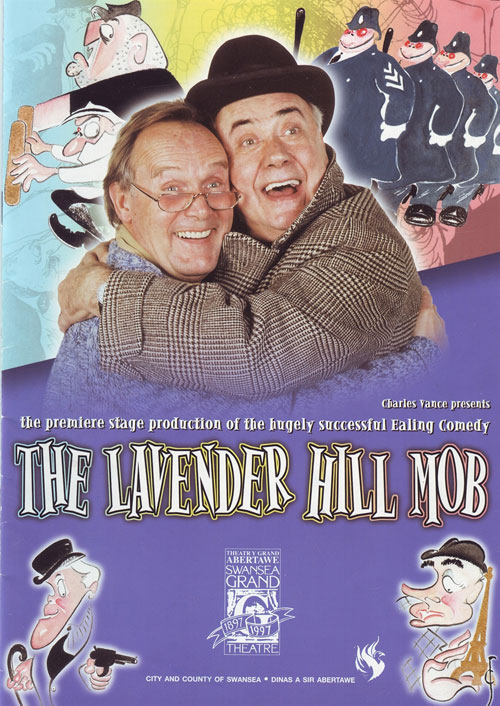
UK TOUR
The Lavender Hill Mob
Adapted by Clive Francis, Paul Minett and Brian Leveson
Directed by Clive Francis
Cast included: Victor Spinetti, Michael Melia, Jack Wild, Claire Harding
Clive Francis as the diffident Henry Holland is excellent. As director and co-adapter he makes the part his own, relishing his expertly written monologue, in which every line’s a winner.
Robin Duke, Blackpool Gazette
Again I was horribly out of work and despairing when producer Charles Vance rang me out of the blue and asked whether I’d be interested in adapting this famous Ealing Comedy for the stage. I’d never adapted anything in my life and didn’t even know whether I could even write, so I called upon my two chums from the Piglet Files, Paul Minnet and Brian Leveson, to give me a hand. For those who know the movie, it has a huge cast of police, customs officials, French gendarmes and in one scene over 50 schoolgirls. Charles Vance was insistent that it should be for a cast of no more than 5! Not only that, but he wanted me to play the Alec Guinness role and also to direct it. I was so desperately in need of a job at the time, I said yes to the lot! As it turned out it only worked by the skin of its teeth. Not a piece of work I’m particularly proud of except for the fact that it brought me into contact with people I’ve grown terribly fond of over the years.
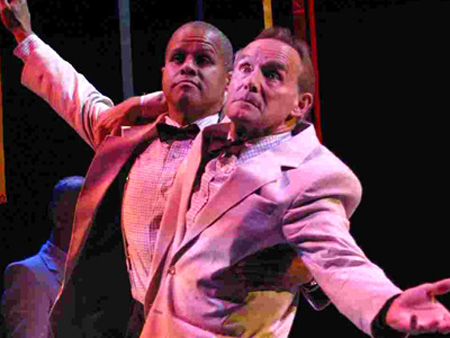
UK TOUR
Travels with My Aunt
Adapted from Graham Greene's book by Giles Havergal
Directed by Richard Baron
Role: Aunt Augusta
Cast included Gary Wilmot, Jeffrey Holland, Andrew Greenough
Clive Francis is superb as the Aunt, frail and making her wishes known in a voice combining the quaver and the steely command.
Jeremy Kingston, The Times
Clive Francis brilliantly captures the mannerisms and niceties of an eccentric old English lady who has spirit.
Mary-Jane Carryette, Cambridge News
Clive Francis plays Aunt Augusta, a shrunken figure, with a quavery voice, a twitching mouth and full of waspish remarks.
Robert Butler, Mail on Sunday
It was Giles Havergal’s extraordinary adaptation of Graham Greene’s novel that really gave me the impetus to write, albeit behind other authors ideas. A few months later I was commissioned by Nottingham Playhouse to adapt The Hound of the Baskervilles which I then followed with Three Men in a Boat and Our Man in Havana.
UK TOUR
The Hollow Crown
Devised by John Barton
Directed by John Barton
Role: Various
Cast included: Donald Sinden, Richard Johnson, Suzannah York
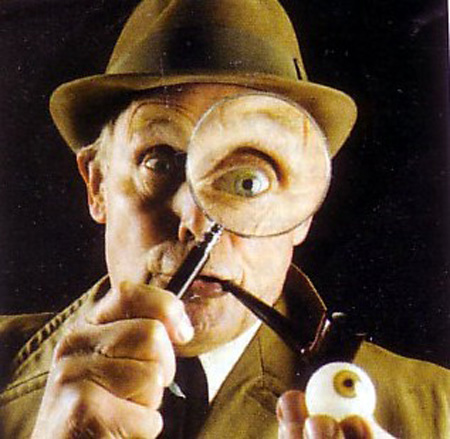
BRISTOL OLD VIC
Loot
by Joe Orton
Directed by David Farr
Role: Inspector Truscot
Cast included: Pooky Quensel, Edward Hogg, Luke Jardine, Andrew Melville
Clive Francis’ doggedly unfazed Defective Truscott, sporting a mac, trilby and trim Hitler moustache, stands in neat contrast to the rest of the cast.
Dominic Cavendish, The Daily Telegraph
Clive Francis’ Truscott is a grotesque portrait of smug police despotism. Francis has a field day with the detective’s pompous bureaucrat speak and arbitrary bursts of violence.
Steve Wright, What’s On Stage
It was great fun to revisit this play since playing Dennis back in 1968, and to get the chance of playing another of Orton’s great grotesques. The part of Truscott, though ostensibly the most anachronistic figure, actually feels the most up-to date, not so much a throwback to stage thrillers of yore as a warning about where unbridled police power can lead tomorrow.
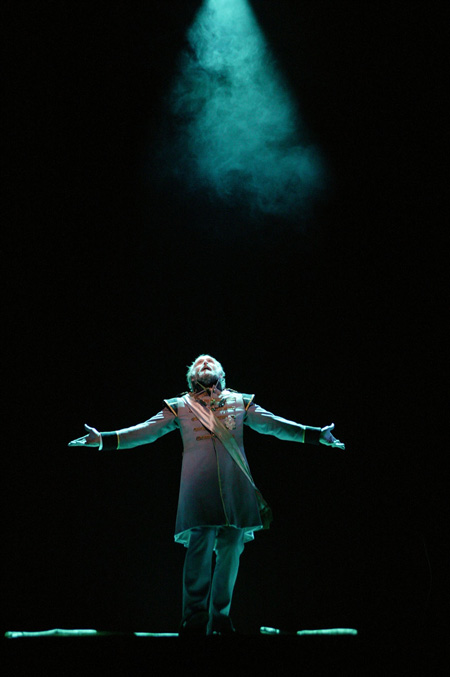

NOTTINGHAM PLAYHOUSE
The Tempest
by William Shakespeare
Directed by Richard Baron
Role: Prospero
Cast included: Eilidh Macdonald, Michael Melia, Graham Crammond, Matthew Chamber, Matthew Bugg
Francis' Prospero is a vibrant, zestful character who has an abundance of love for his daughter and hatred for those responsible for sending him to the island. He's almost insane with power when Ariel brings the travellers to Prospero's cell - yet his forgiveness and reconciliation at the end evoke huge admiration because of the vast change in his temperament.
Steve Orme, British Theatre Guide
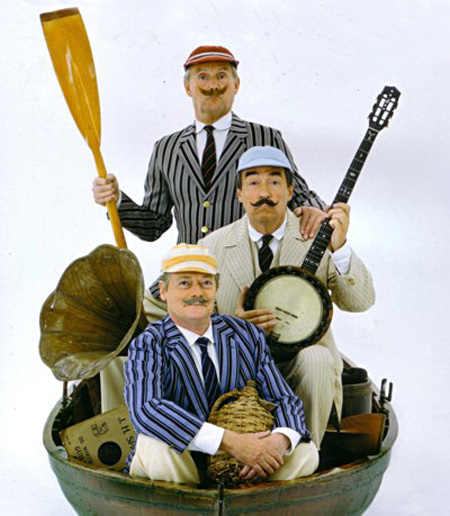
UK TOUR
Three Men in Boat
by Jerome K Jerome adapted for the stage by Clive Francis
Directed by Paul Jepson
Role: Jerome K Jerome
Cast included Simon Ward, Neil Stacey
Clive Francis captures perfectly the book’s generous spirit and often verbally luxuriant style as the narrator.
Charles Spencer, The Daily Telegraph
Clive Francis, who has an agreeably impish air, is also responsible for the stage adaptation, and I suspect has almost as much fun doing this show as the audience has in watching it.
Quentin Letts, Daily Mail
This was the first of my stage adaptations that I performed in, which turned out to be a mixture of fun and rage. The director took it upon himself to engage a young man who had never designed a stage play in his life, the result was an uneven revolve that took it upon itself to break down most nights and costumes that were ill-fitting and bizarrely inappropriate. Never mind, at least the three actors had fun.
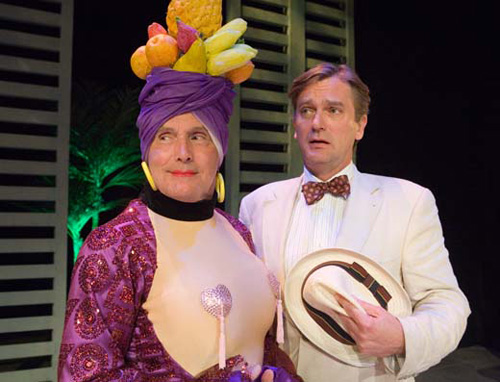
UK TOUR
Our Man in Havana
by Graham Greene
adapted for the stage by Clive Francis
Directed by Richard Baron
Role: Several
Cast included: Simon Shepherd, Kelly Adams, Hywel Morgan
Clive Francis expertly and convincingly provides us with the head of MI5, a German spy, a nightclub hostess and a number of other characters.
Shelia Connor, British Theatre Guide
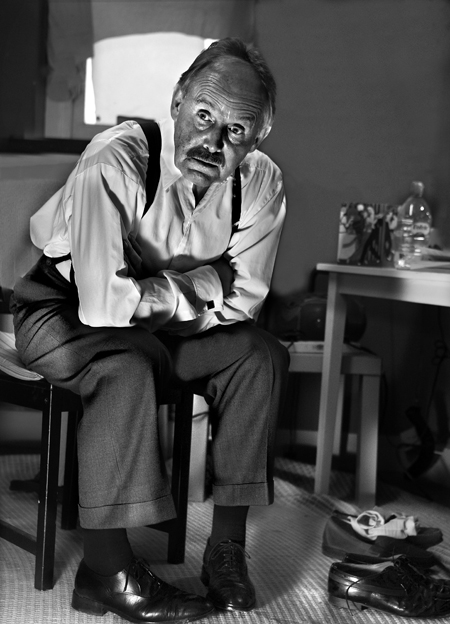
ORANGE TREE THEATRE, RICHMOND
The Skin Game
by John Galsworthy
Directed by Sam Walters
Role: Hornblower
Cast included: Lynn Farleigh, Geoffrey Beevers, Richard Hollis, Graham Seed, Edward Bennett
This is a surprisingly angry and vehement play that, in Sam Walters' punchy revival, gets excellent performances from Clive Francis as the blustering, land-grabbing Hornblower.
Michael Billington, The Guardian
There's a first class performance from Cilve Francis as Hornblower"
John Peter, The Sunday Times
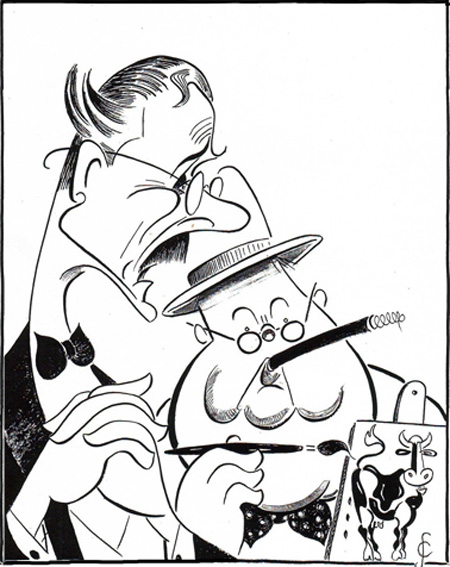
UK TOUR
Never So Good
by Howard Brenton
Directed by Howard Davies
Cast included: Jeremy Irons, Ian McNeice, Anna Chancellor, Anna Carteret, Robert Glenister
Fine performance from Clive Francis as a bullish, bustling Eisenhower.
Christopher Hart, The Sunday Times
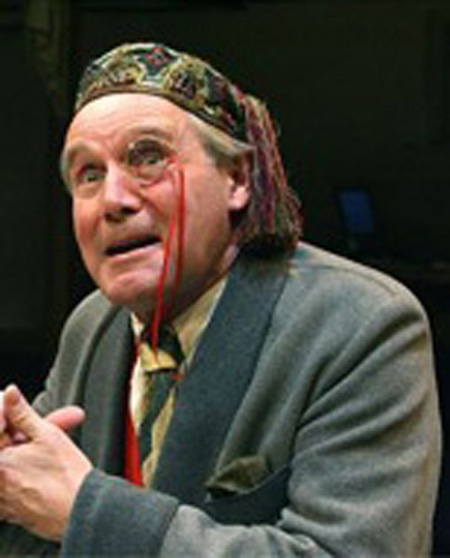
ORANGE TREE THEATRE, RICHMOND
The Woman Hater
by Fanny Burney
Directed by Sam Walters
Role: Sir Frederick
Cast included: Auriol Smith, Michael Elwyn, Jennifer Higham, Amy Noble
Sir Roderick, beautifully played by Clive Francis in a monocle and tasselled toque, is a demented monster who argues that women are fit for nothing "except to sew a gown and make a pudding.
Michael Billington, The Guardian
Clive Francis's delightful performance, is a comic pre-coronary in a tasselled smoking hat.
Paul Taylor, The Independent
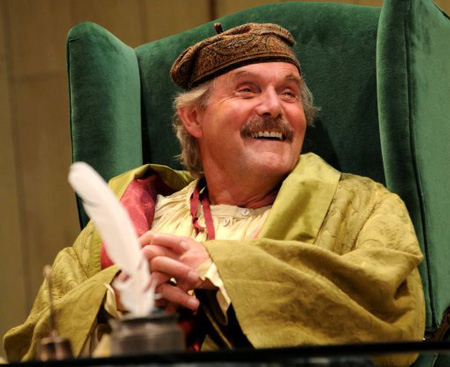
LIVERPOOL and ENGLISH TOURING THEATRE
The Hypochondriac
by Moliere. Adapted by Roger McGough
Directed by Gemma Bodinetz.
Role: Argan
Cast included: Leanne Best, Neil Caple, Simon Coates, Toby Dantzic, Jake Harders, Chris Porter, Lucinda Raikes, Brigid Zengeni
Clive Francis gives Argan a more genial temperament than in the original, though it is hard to imagine him otherwise, given the dapper wordplay Roger McGough provides for him. Still, it is hard to complain while enjoying the relish this versatile actor brings to the lines.
Jeremy Kingston, The Times
With a mischievous smile and capering feet, Clive Francis’s Argan transcends the affable fool to a character that you want to turn out well, despite him thoroughly deserving an unhappy comeuppance.
Laura Davis, Liverpool Daily Post
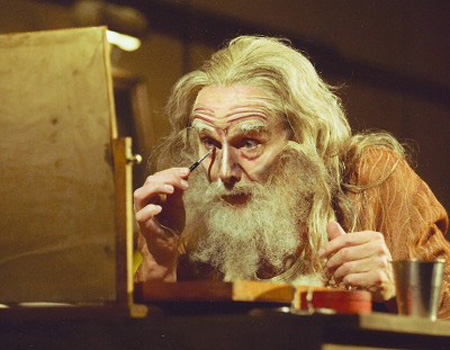
PALACE THEATRE, WATFORD
The Dresser
By Ronald Harwood
Directed by Di Trevis
Role: Sir
Cast included: Graham Turner, Sarah Berger, Penelope Beaumont
Francis' performance is nothing short of magnificent, a true tour de force. He dons the cloak of senility so convincingly that when he says the life blood is draining out of him, you believe him and will him on, while his transformation as King Lear is equally amazing and gives us a fascinating lesson in the art of stage make-up.
Claire Brotherwood, The Stage
Like the middle-aged Wolfit, Sir is described as somewhat bulky (Norman speaks of 'a man of his proportions') and in life Clive Francis seems much more trim so I was surprised the weight that he brings both physically and vocally to the role. It is a fine performance that offers the man's complexities, lifted from despair to vigour by the prospect of a full house, drive by a force that he does not understand.
Howard Loxton, British Theatre Guide
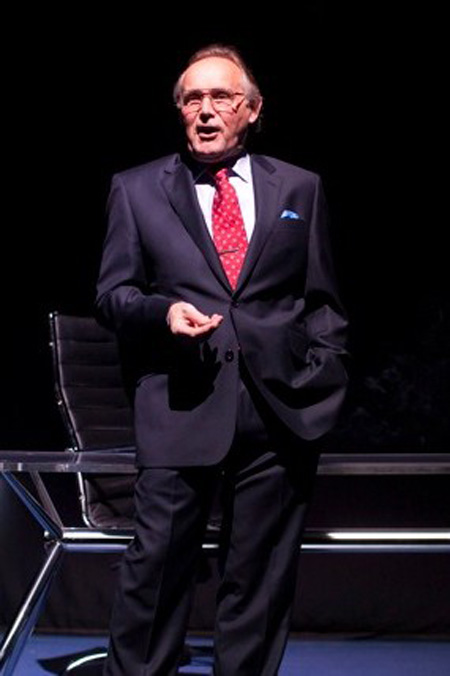
NOEL COWARD THEATRE
Enron
by Lucy Prebble
Directed by Rupert Goold
Role: Ken Lay
Cast included: Corey Johnson, Sara Stewart, Paul Chahidi
The CEO of Enron, Ken Lay, played with hand-rubbing Texan gusto by Clive Francis, is a one-dimensional repulsive greedy guts.
John McKeown, The Independent
I took over the part of Ken Lay from Tim Piggott Smith. This was the second time I’d stepped into this actor’s shoes, the first being Benefactors back in 1984. I was lucky to spend the tail-end of this highly successful production in London, at the Coward Theatre, before taking it on the road around the UK and across to Ireland. I can’t say I ever understood a word of it!
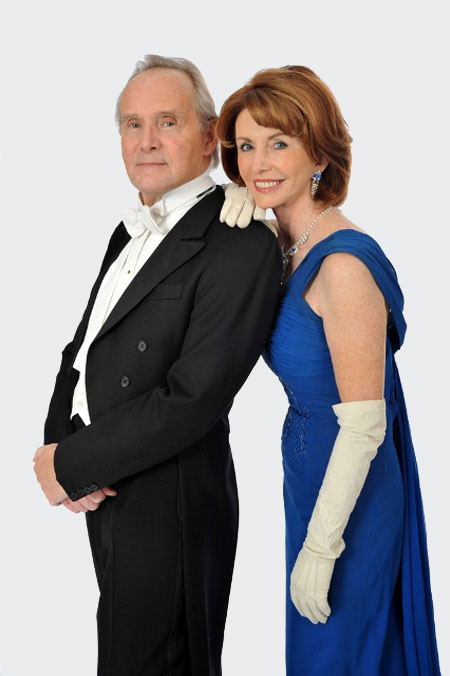
UK TOUR
The Reluctant Debutante
By William Douglas Home
Directed by Belinda Lang
Role: Jimmy Broadbent
Cast included: Jane Asher, Louise Calf, Alex Fenton, Lucy May Barker, Ed Cooper Clark, Belinda Lang
Clive Francis is a delight to behold as the curmudgeonly yet warm-hearted Jimmy Broadbent, whose opening qualms about his morning egg ("I don't like the way it's looking at me") sets the jocular tone for the rest of the play, and whose hilarious heart-to-heart with his prospective son-in-law - played-out under the guise of a fake scuffle - ends the evening with equal warmth, wit and originality.
Fabcat, Cambridge News
Clive Francis as the debutante's father was in grave danger of stealing the show.
Christopher Hansford, Bath Chronical
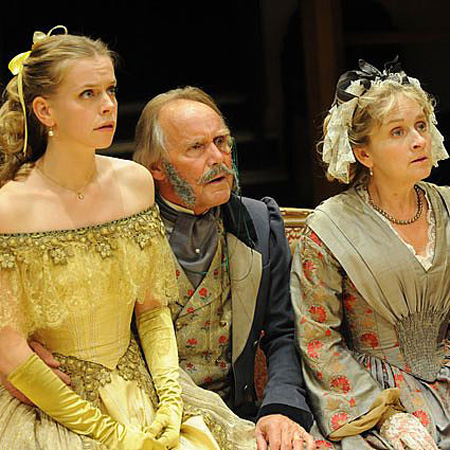
ORANGE TREE THEATRE, RICHMOND
Three Farces
By John Maddison Morton
Directed by Henry Bell
Role: Various
Cast included: Natalie Ogle, Edward Bennett, Stuart Fox, David Oakes, Jenifer Higham
Performed by an exceptionally strong Orange Tree cast the three playlets survive the passage of time, thanks especially to Clive Francis who opens the evening as a bellicose old buffer, a patriotic citizen who dismisses his two nieces’ suitors as miserable cowards. In, A Most Unwarrantable Intrusion, we again find Francis at home, but this time as a henpecked husband enjoying a moment of peace and solitude without the interference of his wife or the servants. Alas, this scene of domestic serenity is cruelly disrupted by the entry of Edward Bennett’s intruder, stripping off his clothes for a dip in the fish pond before barging into the parlour to take possession of the best chair and a couple of jewelled snuff boxes, as well as snarling with all too believable menace.
The audience soon works out the probable solution to this almost Pinteresque tale of territorial invasion, but one is still gripped by the thrilling power of Bennett’s control of both scene and plot, as Francis generously cedes the play’s focus to his young co-actor.
John Thaxter, British Theatre Guide
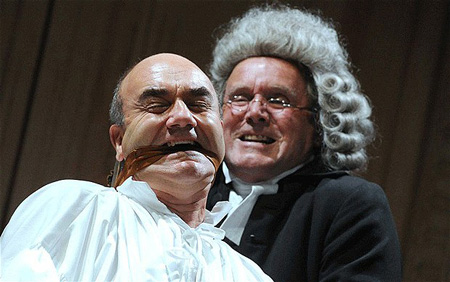
APOLLO THEATRE
The Madness of George III
by Alan Bennett
Directed by Christopher Luscombe
Role: Dr. John Willis
Cast included: David Haig, Beatie Edney, Nicholas Rowe
